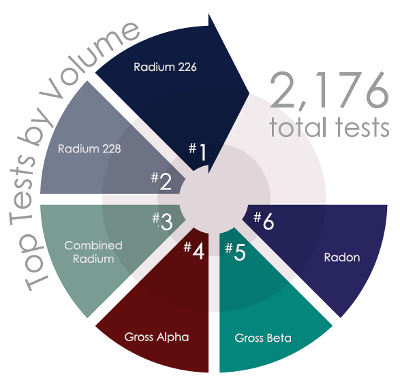Radiochemistry
The Radiochemistry unit performs analyses to determine radioactivity primarily in water and soil, but also has performed analyses of air, food, milk, urine and foliage. Radionuclides can be harmful to human health if inhaled or ingested. They are commonly found in low concentrations in the Earth's geology, but are also artificially produced by nuclear reactors.
The Hygienic Laboratory's Radiochemistry staff is part of Iowa's Radiological Emergency Response Team. This group provides field monitoring and technical consultation to the Iowa Department of Public Health and the Iowa Homeland Security and Emergency Management Division of the Iowa Department of Public Safety in the unlikely event of an act of terrorism or an accident at one of the four nuclear power plants in or near Iowa. The laboratory can evaluate the extent to which radioactive materials have been released from an incident.

FY13 achievements:
- Implementation of alpha spectroscopy methods for use in emergency response and other projects began this year. The method measures the concentration of alpha-emitting radionuclides. Alpha-spectroscopy is a very sensitive method of identifying alpha-emitting isotopes in low level activity that greatly expands the laboratory's emergency response and research capabilities.
- Radiochemistry began a collaborative research project with Professor Michael Schultz of the University of Iowa Radiology and Radiation Oncology Department to determine the levels of radionuclides in the flow-back water used in hydraulic fracturing, or "fracking." Fracking is the process of drilling for natural gas by injecting water, sand and chemicals into the ground at high pressure. This fractures the shale rocks and releases natural gas, which otherwise is unreachable by conventional methods. Flow-back water is the water that comes back to the surface during the fracking process.